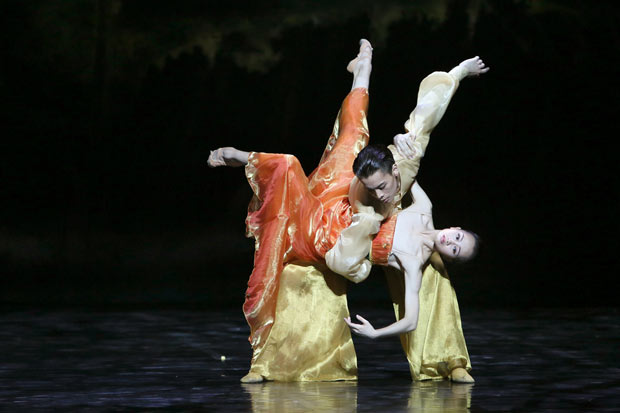
© Shanghai Ballet. (Click image for larger version)
Shanghai Ballet
Echoes of Eternity
★★★✰✰
Shanghai, Grand Theatre
2 May 2016
www.shanghaiballet.com
The ballet comes to London’s Coliseum 17-21 Aug 2016.
The inspiration for Echoes of Eternity was found in a slim volume that choreographer, Patrick De Bana discovered in a downtown Shanghai bookshop while he was rehearsing Shanghai Ballet in his version of Jane Eyre, which came to the London Coliseum in 2013. He was looking for a Chinese divertissement from the detail of Charlotte Bronte’s novel (which, by the way, is hugely popular in China) and came across an English translation of The Song of Everlasting Regret, a narrative poem from the Tang Dynasty composed by Bai Juyi in the year 806. The poem contains just 120 verses and within hours of his purchase, De Bana was already hooked on this tragic romanticised version of the real-life affair of the concubine Yang Guifei and her Emperor, Xuanzong. And, the narrative for his next ballet was born.
The production premiered at the monumental Shanghai Grand Theatre on 30 July 2015 and will make its London debut (again at the Coliseum, later this summer). The Shanghai Ballet, formed in 1979, is making great strides under the committed and sensitive leadership of former dancer, Xin Lili, who joined the company in its second year and has remained with it ever since, becoming artistic director in 2001. As a dancer, Xin Lili was a prime interpreter of Shanghai Ballet’s signature homegrown ballet, The White-Haired Girl.
To his credit, the multi-national De Bana – born in Hamburg to a German mother, and Nigerian father – has produced a ballet that is evocatively Chinese in every way but without a scintilla of western cliché. Perhaps its greatest asset lies in his patient approach to an unfolding story that has much to do with procrastination.
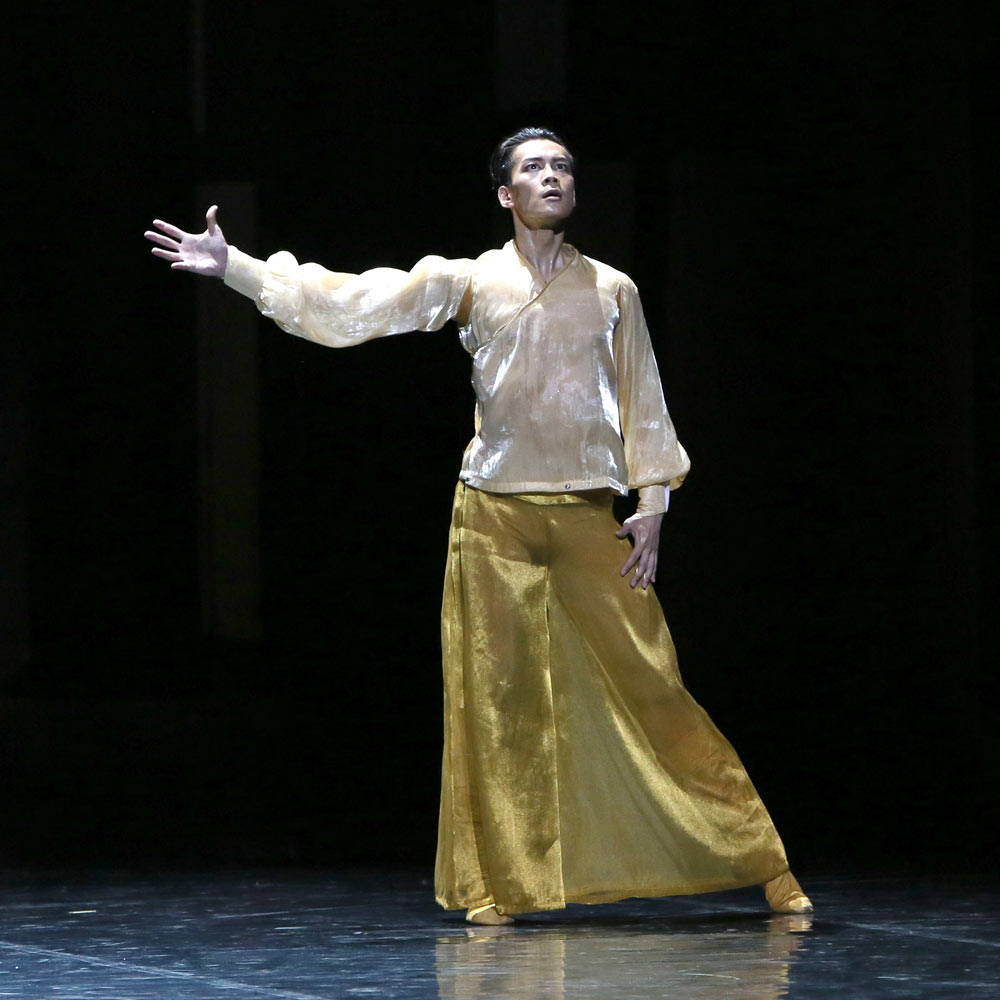
© Shanghai Ballet. (Click image for larger version)
In a nutshell, Yang was the wife of Xuanzong’s son but despite the widower father allegedly having 3,000 young women held as palace captives for his sole entertainment, he took an exclusive fancy to Lady Yang and she became his consort. The Emperor was so entranced by her beauty that he forgot all his responsibilities as a ruler even after a bitter war breaks out. Xuanzong is so distracted that his leaderless army is clearly to be defeated and, realising this, Yang Guifei eventually makes the supreme sacrifice for love of Emperor and China and she commits suicide to free Xuanzong from his obsession. In Bai’s poem, the Emperor leads his army to victory and then receives a message from Yang Guifei in the afterlife to say that somewhere in eternity they will meet again.
It is a tragic romance that lends itself to ballet with great clarity and depth, providing a narrative that is easy to follow without prior knowledge of Bai’s poem or reading an English synopsis beforehand. De Bana addresses it in a neoclassical language, with a strong emphasis on Chinese expressionism and an absence of pointe shoes. He develops the crucial love story with boldness and imagination, through four delightful pas de deux, which engage us on a journey from infatuation to devotion.
These leading roles were performed by two dancers at opposite ends of Shanghai Ballet’s spectrum. The company’s uncontested star, Wu Husheng, portrayed the Emperor, while a teenager, just 18 months out of ballet school, Qi Bingxue took advantage of another dancer’s indisposition to claim the role of Yang Guifei with considerable aplomb. Qi was in the process of winning the silver medal at the Beijing Ballet Competition (there was no gold, so this was effectively first place) when she got the call to rush back for rehearsals.
Wu is an expressive male lead with a solid, poetic technique of long, yearning arabesques, laconic jumps and landings so soft that it seems he must be landing full-square on feather pillows. He has a strong dramatic presence, marking the autocratic, bored indifference of the unhappy Emperor, turning through excited infatuation to an undiluted commitment to his new consort.
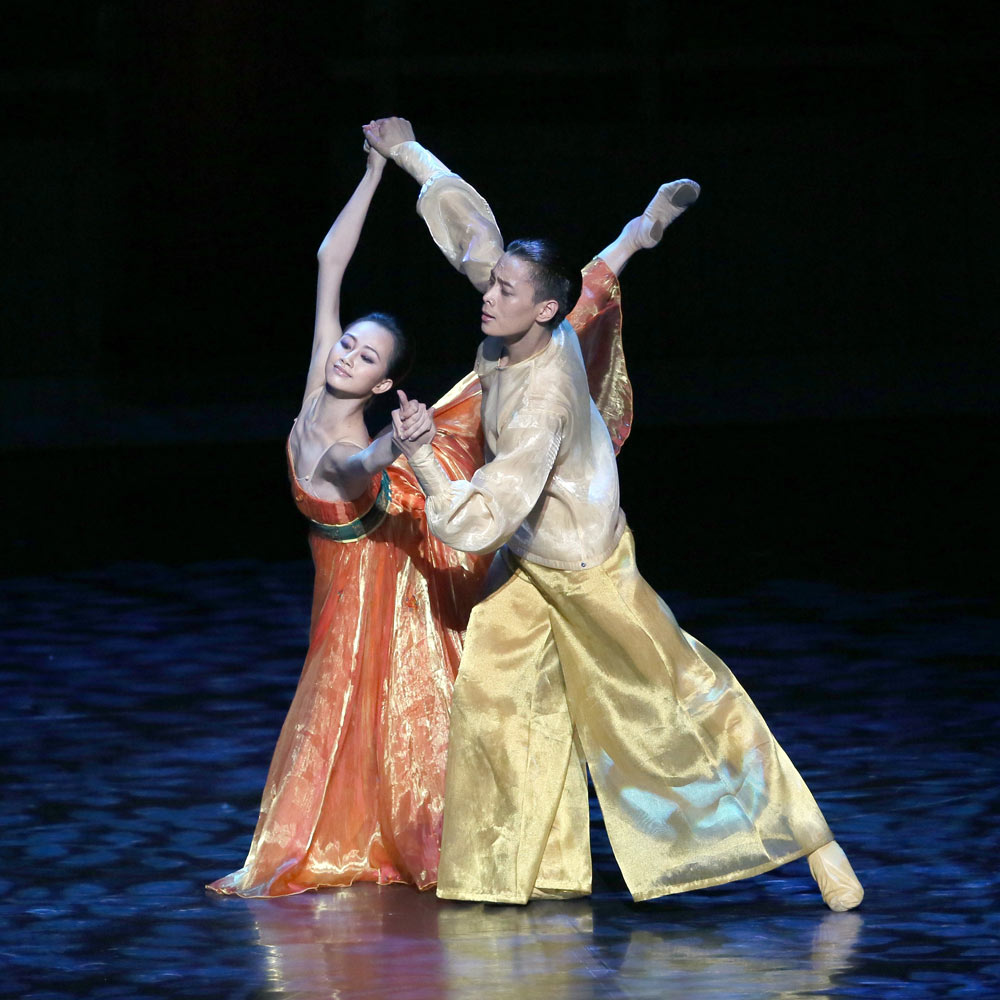
© Shanghai Ballet. (Click image for larger version)
Qi is that rare whisper of a ballerina; ethereal, long and longing, happily possessing the coquettish smile of which Bai’s verse speaks. At just nineteen, she has claimed this role to be her own with an all-possessing assurance and I hope that I don’t have to continue imagining just how good her interpretation of Giselle will become.
There are four other soloists of note. Zhang Wenjun offers an ebullient reading of An Lushan, the real-life opportunist general who attempted to exploit the Emperor’s distractions in love by mounting a rebellion against him. Zhang Yao is the austere eunuch official (a kind of Chinese “Sir Humphrey”) who runs the Emperor’s administration and urges him to return to the affairs of state rather than of the heart, as An Lushan’s army closes in. And, Wu Bin portrayed a mysterious figure clad in a red satin jacket, supposedly a Marshall in the Emperor’s army, known as Chen Xuanli.
Another mysterious figure was there from the very start of the ballet, often with her back to the audience. At first one supposes that the beautiful Zhao Hanbing must be the highest of the concubines (known as the Guifei) but she turns out to be the Moon Fairy, both a harbinger of the tragedy to come and the messenger of the echoes of eternity that will bring the Emperor and Lady Yang back together. Zhao provides yet another lesson in ethereality; floating gossamer-light across the stage.
De Bana’s choreography was especially effective in the group scenes and not least in the descriptive expression of the organised chaos of warfare, well drilled and delivered by the excellent male corps of the Shanghai Ballet.
The music chosen by De Bana follows the modern neoclassical trend of being a patchwork composite of melodies and themes, unsurprisingly including ubiquitous extracts from Philip Glass and Henryk Górecki but also taking musical inspiration from Armand Amar, Ravia Goldschmidt and Kodo. The recorded score was not always well amplified at this performance.
Former étoile dancer at the Paris Opera Ballet, Agnes Letestu, designed the rich array of costumes and the sparse but colourful set was imaginatively created by Indonesian/Javanese designer, Jaya Ibrahim who sadly died, aged 67, just a few weeks before the world premiere. James Angot’s lighting designs add mystery and suspicions of intrigue.
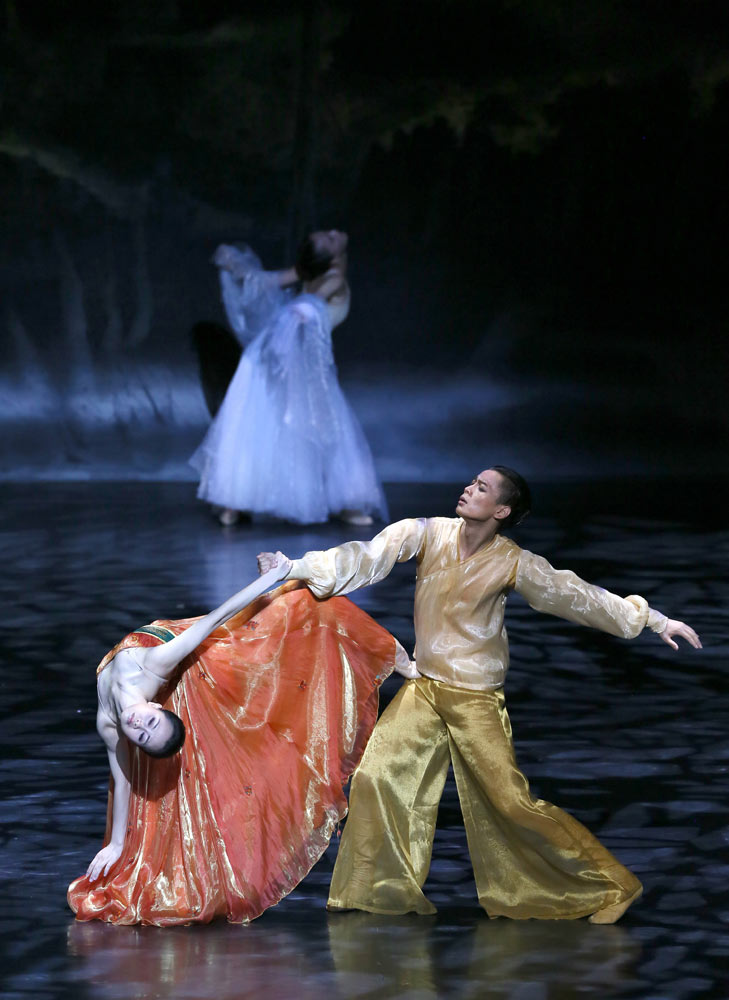
© Shanghai Ballet. (Click image for larger version)
The narrative takes a good while to get going and the first twenty minutes are taxing to the concentration, which is then absorbed by the gorgeous opening pas de deux for Wu and Qi. The second act is more dynamic, largely due to De Bana’s choreography for the armed conflict and the production gains hugely from a quietly enigmatic closure.
De Bana has already secured a place within the core repertoire of the Shanghai Ballet through his thoughtful and imaginative account of Jane Eyre, an English story beloved by the Chinese. The signature ballet of the Shanghai company may be The White-Haired Girl but De Bana has given it another Chinese classic. In the year that we celebrate the 400th anniversary of the deaths of both Shakespeare and Cervantes, it’s salutary to imagine that Bai Juyi was writing 800 years before they were active; and that it has taken over a millennia to portray his story of everlasting love, itself echoing through an eternity, in a ballet.

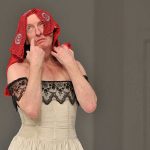
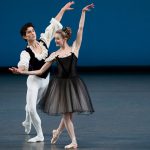
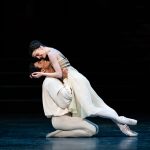
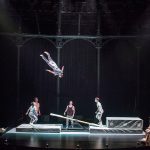

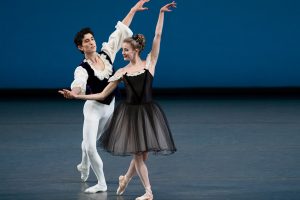

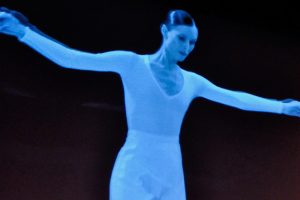


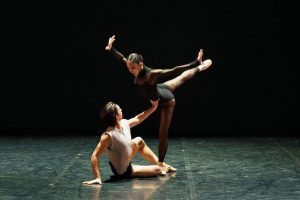
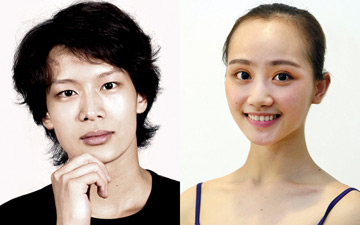
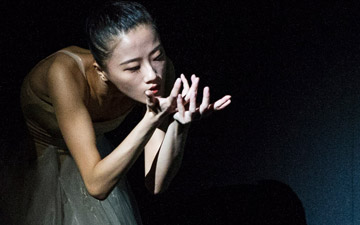
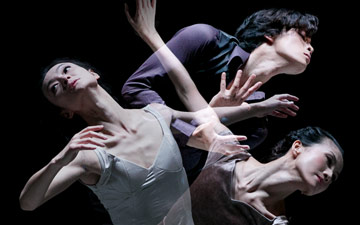
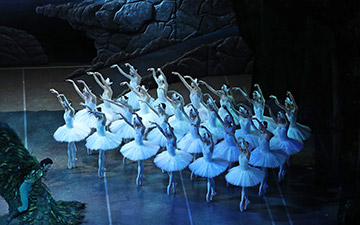
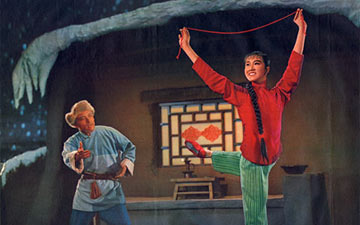
I thoroughly enjoyed the opening night at the Coliseum of Echoes of Eternity. Considerable emotional expression and intensity was conveyed and the company was well rehearsed. The warring scenes were excellent and I found myself enthralled for the entire evening. I always look forward to a new ballet and there were numerous interesting aspects to this one. I won’t go on – I suggest you see it!
The FT review was inexplicable; I don’t think we were at the same ballet …